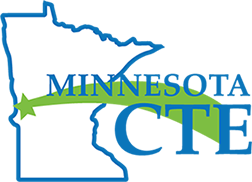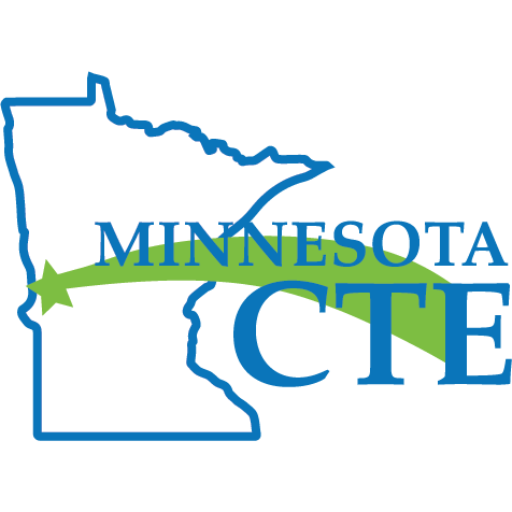The only Minnesota-approved CTE alternative teacher preparation program in the state.
We prepare candidates for teaching careers in Agriculture, Business & Marketing, Family & Consumer Sciences, Health Science (Medical), Trade & Industry (Construction, Manufacturing, Transportation, Communications Technology), and Work-Based Learning.

COMING SOON. Our initial licensure program is for candidates new to the teaching profession who need both teaching methods and content standards for Minnesota licensure.

Our additional licensure teacher preparation program is for candidates wanting to add an additional teaching license to their current Tier 3 or Tier 4 Minnesota teaching license.
Standards of Effective Practice
Note: Initial Licensure/Pedagogy is coming soon.
Content Standards
Completed Licensure Candidates
Anoka-Hennepin, Browerville, Cloquet, Dilworth-Glyndon-Felton, Glencoe-Silver Lake, Lac qui Parle Valley, Lakeview, Mankato, Mounds View, and Roseau.
Aitkin, Albert Lea, Alexandria, Anoka-Hennepin, Barnesville, Brooklyn Center, Career Pathways (Saint Paul), Chisholm, Edina, Elk River, Fond du Lac Ojibwe, Goodhue, Granada-Huntley-East Chain, Grand Meadow, Grand Rapids, Hayfield, Hibbing, Hill City, Howard Lake-Waverly-Winsted, International Falls, Inver Grove Heights, Jackson County Central (Jackson), Janesville-Waldorf-Pemberton, Jordan, Kasson-Mantorville, Lake Park-Audubon, Lyle, Mahtomedi, Mesabi East (Aurora), Minneapolis, Minnewaska, Moorhead, Morris, Mounds View, Mountain Iron-Buhl, New Ulm, New York Mills, Northeast Metro 916 (White Bear Lake), Parkers Prairie, Pelican Rapids, Perham-Dent, Rochester, Rock Ridge, Runestone Area Ed District (Alexandria), Saint Paul, Sibley East, South St. Paul, St. Francis, St. Louis County, St. Peter, Tracy, Underwood, Warroad, Wayzata, West St. Paul-Mendota Heights-Eagan, Windom, Worthington, and Zumbrota-Mazeppa.
Alexandria, Anoka-Hennepin, Ashby, Barnesville, Battle Lake, Bemidji, Bertha-Hewitt, Brainerd, Brandon-Evansville, Burnsville-Eagan-Savage, Chisago Lakes, Cloquet, Crookston, Crosslake Charter, Deer River, Detroit Lakes, Duluth, East Grand Forks, Elk River, Fergus Falls, Fertile-Beltrami, Forest Lake, Frazee-Vergas, Freshwater Ed. District, Goodridge, Greenbush-Middle River, Hibbing, Lakeville, Lancaster, Le Sueur-Henderson, Lionsgate Academy (Minnetonka), Mankato, Minneapolis, Montevideo, Nashwauk-Keewatin, North Lakes Academy, Northeast Metro 916 (White Bear Lake), Northern Lights (Warba), Osakis, Osseo, Pelican Rapids, Pine City, Redwood (Redwood Falls), Lakes Country Service Cooperative (Fergus Falls), Southwest/West Central Service Cooperative (Marshall), Roseville, Saint Paul, Sauk Centre, Sibley East, Sourcewell (Staples), Spring Lake Park, St. Cloud, St. Francis, St. Louis Park, St. Michael-Albertville, Stillwater, Thief River Falls, Tri-City United (Montgomery), TRIO Wolf Creek (Chisago City), Warroad, Waubun-Ogema-White Earth, and White Bear Lake.
Anoka-Hennepin, Barnum, Bloomington, Cambridge-Isanti, Cloquet, Cromwell-Wright, Fairmont, Grygla, Hancock, Hills-Beaver Creek, La Crescent-Hokah, Minneapolis, Nashwauk-Keewatin, New London-Spicer, Princeton, Rockford, Saint Paul, South Koochiching (Northome), White Bear Lake, and Willow River.
Bloomington, Fergus Falls, Frazee-Vergas, Hawley, Kittson Central (Hallock), Moorhead, and Tri-County (Karlstad).
Frequently Asked Questions
As a result of a legislative appropriation and funding from several grants, we are generally able to offer our program to candidates at no cost to them personally. There is a limited number of spaces based on this grant funding; if funding is exhausted, federal Perkins funding may be an option to support these costs.
LCSC’s program is self-paced and is not time-based and takes candidates varying times based on backgrounds and experiences. Some candidates have been able to complete the stack of micro-credentials in as short of time as approximately six weeks, some candidates have taken much longer.
LCSC’s licensure program is an alternative teacher preparation program, which is defined in statute as a teacher preparation program based not in higher education. LCSC’s program is highly individualized. LCSC is most concerned about the application of the content and not simply the knowledge of it; which is atypical of most traditional teacher preparation experiences. This does take some getting used to for most candidates, but also provides for a rich learning experience in the end.
We do not award grades or academic credit. The program can take a year or less or several years, depending on the candidate.
LCSC’s program is all virtual and on-demand, except for any required field experiences, which must be school-based under Minnesota Rule. The field experience is job embedded and only in extreme circumstances would require the candidate to take time off their normal teaching duties. We offer some instructional components as in-person professional development as well, which can replace virtual components, but these are opt-in and for candidates who prefer in-person to online. In-person professional development is scheduled regionally across the state, based on demand.
A “CTE license” is a Minnesota teaching license in which the teacher has learned the foundational skills of career and technical education as well as the content and technical skills required for their curriculum. Technically, there is no specific statutory or rule language that refers to a license as a “CTE license;” however, there is language that indicates “appropriately licensed CTE teacher,” which is generally the same. It is also important to note that “CTE licenses” are a category of licenses, not a specific license. CTE licenses are content/career specific, for example agriculture, construction, medical. A full list of current CTE licenses is available here.
Vocational Education (Vo-Ed) evolved into Career and Technical Education (CTE) in the 1990s and 2000s. The 2018 Perkins V Strengthening Career and Technical Education act definitively shifted Vocational Education to Career and Technical Education, dropping the word vocational from the act’s title. At a very superficial level, CTE and Vo-Ed look like they are the same thing, but philosophically they are fundamentally different. CTE provides students with experiences from career exploration and career development all the way to occupation-specific technical skills leading to careers that are high-skill, high-wage, and in-demand. CTE programs align secondary, postsecondary, business, and industry to create multiple opportunities in a career pathway. The philosophy of vocational education was to provide those very specific technical skills tracking towards a specific job right out of high school. References to vocational, Vo-Ed, or Voc-Ed are antiquated and conjure up an image that is not reflective of the vast array of today’s highly technical and in-demand careers.
In current statute and rule, there is no reference to vocational certification or CTE certification. Vocational licenses have not been issued in Minnesota since 1999. Most people who hold an old vocational license have now retired, but those who have them are still able to renew them. The licenses were very specific to a skillset and aligned to a skilled trade. Minnesota only issues licenses and endorsements to licenses, not certifications. These terms often refer to licenses that are no longer available. To avoid confusion, these terms should not be used.



